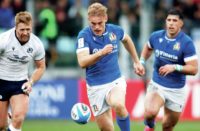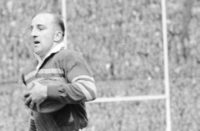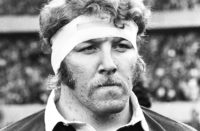 They called Rocky Marciano the ‘greatest slugger in boxing history,' a fitting description for a world heavyweight champion unbeatable over his entire pro career.
They called Rocky Marciano the ‘greatest slugger in boxing history,' a fitting description for a world heavyweight champion unbeatable over his entire pro career.
The bald facts tell of a savage indestructibility – 49 fights, 49 wins, 43 inside the distance, the vast majority by knock-out. Nobody laid them out quite like ‘The Rock,' except when it came to facing a Welshman made of the same indestructible stuff.
The world at large had never heard of Marciano and Jack Matthews when fate pitched them into the same ring during the Second World War. The story of their collision, at RAF St. Athan in March 1943, demands to be told in tribute to the man known the rugby world over as Dr Jack.
Marciano, then 19, was based at the South Wales airfield as a GI in the US Army, Matthews as a medical student in the Royal Army Medical Corps. While both waited to be engaged in the global fight raging all around them, the respective armies kept them on their toes by arranging a boxing match.
“I'd been told before the fight that he was a useful boy who could punch a bit,” Matthews told me during an interview for the book, Lions of Wales. “He was a hard boy all right. I'd have been 14 stone then and he was shade lighter and that's about all I can remember.”
The three-rounder went the distance and, in the spirit of Anglo-American co-operation, it was declared a draw. “That's the way it was, boxing just for the fun of it,” Jack said. “There were no knockdowns and I was still there at the end.
“I didn't know whom I'd fought until years later, when it was confirmed that Marciano had been based at St Athan. I was in the pub one night about 50 years later and this bloke came up to me said:
“I was there that night you fought Marciano'.”
When the Brockton Brawler began cutting a swathe through the heavyweight decision, Matthews did much the same on rugby fields from Aberavon to Auckland. As a block-busting centre of unrelenting ferocity, his tackling ensured that he was never short of a few extra patients.
Matthews lived to the grand old age of 92 before passing away on Wednesday after a long illness. He might not have survived much beyond his 20th birthday had he been allowed to stay in the RAF and pursue his ambition of becoming a Battle of Britain pilot.
When the War Office discovered that he was a medical student, they decided he would be of more value back at college completing his studies. He returned to the fray at the earliest available opportunity, finishing the war in a glider regiment by which time he had lost six of his best rugby years.
Matthews, therefore, was never able to accumulate the towering stack of caps taken for granted among other greats, a fact which made his status as one of them all the more revealing. Having very nearly played for Wales as an 18-year-old schoolboy before the war, he had to wait another eight years for the resumption of international fixtures after it.
A final trialist in 1939, the teenager left a lasting impression. Arthur Rees, a seasoned back-row forward from London Welsh, took advantage of a break in proceedings to tell Matthews: “Boy, with a hand-off like that, you're going to be a great player”.
Matthews in his prime would not have been particularly imposing by today's gargantuan physical standards but he turned the tackle into an art form. There were times when dazed opponents felt as though the doctor had brought along his own anaesthetist. A Matthews hit, perfectly legitimate, meant you stayed hit.
“I had a big heavy sandbag in the loft of my home. I spent a lot of time tackling that bag, hitting it as hard as I could, developing my technique. What people generally don't realise is the importance of accelerating into the tackle. You've got to do that otherwise you won't be able to hit a 16-stone opponent and knock him back.”
Post-war, Matthews captained Cardiff, Wales and the Lions. Along the way, he formed a centre partnership with Bleddyn Williams which turned into a lifelong friendship. They were some pair, a mixture of sublime skill and bone-shaking power so admired in New Zealand that old All Blacks still talk about them in reverential tones.
One of the first requests Graham Henry made when he arrived in Wales to take charge of the national team in 1998 was to meet Dr Jack and his princely side-kick because they had made such a lasting impression on Henry's octogenarian father.
Matthews contribution to sport far outlived his playing career. A medical adviser to the British Boxing Board of Control for many years, he attended all manner of title fights.
He also had a lot of stricken boxers literally in stitches, most notably Henry Cooper who needed a lot of Dr Jack's needlework to close an eye-brow gash on the night he won the British title against Newport's Dick ‘The Milk' Richardson at Wembley in 1963.
Three years after his hitherto inseparable team-mate Bleddyn Williams died at the age of 86, Matthews died after a long illness. It can be safely said without fear of contradiction that there will never be another like him.

























